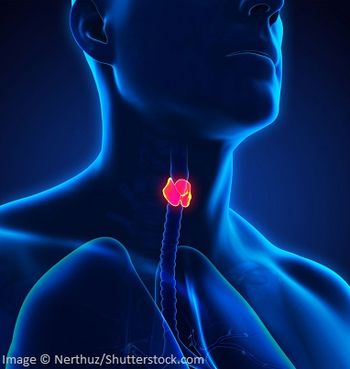
Certain Factors Associated With Decreased QOL in Thyroid Cancer Survivors
A recent study in Surgery found that thyroid cancer survivors reported increased complications related to surgery and radioactive iodine ablation.
Several clinical factors are correlated with significantly worse health-related quality of life (HRQOL) in thyroid cancer survivors, according to the findings of a recent study
“This study supports American Thyroid Association recommendations that less aggressive treatment may be better for low risk thyroid cancer patients and result in better HRQOL,” said
In the current study, thyroid cancer survivors aged 18 to 89 years completed an online survey regarding clinical history, as well as a Patient-Reported Outcomes Measurement Information System (PROMIS) 29 instrument. Goswami et al performed univariable and multivariable modeling to assess domains associated with lower HRQOL scores.
Thyroid cancer survivors (N = 1,743; 88% women and 95% white) reported an increased incidence of complications related to surgery and radioactive iodine ablation. Factors including younger age (< 45 years), postoperative hypocalcemia, dysphonia, dysphagia, scar appearance, and complications from radioactive iodine-including gastrointestinal symptoms, appetite changes, and dry mouth-were all correlated with worse HRQOL scores. Decrease in quality of life was pronounced in younger patients and in those receiving radioactive iodine ablation.
The most frequent long-term adverse effects of radioactive iodine ablation were chronic xerophthalmia (24%) and chronic xerostomia (24%); these effects lasted for months or years. The most frequently reported adverse effects of surgery were short-term dysphagia (63%) and dysphonia (71%), which could last for days or weeks.
“Whatever scientific methods that we’re using now to assess [voice changes, swallowing changes, and so forth] are not corroborating what the patients are saying,” said Busaidy. “But at the end of the day, it’s the patient’s life. And when you measure health-related quality of life, we have to admit that science is not caught up to figure out what patients are telling us. I’m a strong believer that less aggressive treatment is better...But I don’t think that anybody can jump to the conclusion that if we do less aggressive treatment, these health-related quality of life instruments are all going to improve.”
Looking forward, the only way to figure out whether adverse effects that are presumed to be a consequence of treatment are really caused by treatment is to perform longitudinal studies, said Busaidy. In reality, it could be that these adverse effects are attributable to thyroid cancer directly and not treatment per se. To know for sure, she noted, specialists need to directly elicit such complaints both before and after treatment in patients with thyroid cancer.
Busaidy also noted that cancer patients tend to expect certain changes after cancer surgery and, as a result, don’t often present these complaints to their physician. If a physician doesn’t ask about health issues, such as swallowing problems or voice changes, the thyroid cancer patient may never report them.
Pooja Manroa, MD, an endocrinologist and assistant professor of medicine at the University of Pittsburgh School of Medicine in Pittsburgh, pointed out several strengths and weaknesses of the study. “The strength of this study lies in the large sample size and detailed description of the factors affecting HRQOL, [which] were analysis as well as the use of [the] well-validated PROMIS-29 tool,” she said.
“As with all patient reported and survey-based studies, selection bias and recall bias are important to consider as the survey was from a support group. These individuals tend to have experienced a more aggressive disease or more severe complications or may process their disease differently,” said Manroa.
That said, the results set the stage for future research. “Interventions targeted at preventing or managing the treatment complications that contributed to worse HRQOL in thyroid cancer survivors should be developed and studied,” Manroa told Cancer Network.
In recent years, the incidence of thyroid cancer has tripled, but survival is excellent. Consequently, the number of thyroid cancer survivors has grown significantly. These survivors, however, are not experiencing improved HRQOL. Changes in physical, emotional, or psychosocial states after treatment last for years and may reduce health-related quality of life.
A thyroid cancer diagnosis is also accompanied by the stress of lifelong health changes, such as thyroid hormone replacement, long-term surveillance, and risk of recurrence or metastases. Nevertheless, factors driving low HRQOL scores have yet to be fully elucidated.
“Quality of life is understudied in thyroid cancer survivors, and definitely in thyroid cancer we’re behind the eight ball,” said Busaidy.
Newsletter
Stay up to date on recent advances in the multidisciplinary approach to cancer.





































